Download
Roundup July 2011/2
Brian
Wilson
First a correction: I’m indebted to my
colleague John Quinn, who so often interests himself in the
same eclectic range of music as myself, that I’ve been
mistaken for years in believing that Beethoven was wrong to
refer to his Diabelli Variations as dreiunddreißig
Änderungen, believing that he had wrongly counted the
theme itself as one of the 33. In fact, there are 33 variations
in addition to the theme. Recordings often blur
the issue by making the theme plus variation 1 the first track.
My recommendation of the new Paul Lewis recording (Harmonia
Mundi) and the much older Stephen Kovacevich (Philips/Pentatone)
remains valid.
Next, an apology that this Roundup is shorter and less ambitious
than usual: some health problems have limited my use of the
computer keyboard and mouse. Though I’m making more use
of the Dragon dictation programme, it’s probable that the
August edition will be later than usual and there may be only
one. Having already been delayed, I was even further held up
when my laptop crashed after I had converted this Roundup to
html and I had to start over again on my reserve machine, hence
the fact that there are fewer images here than usual.
Download
of the Month
Bedřich SMETANA (1824-1884)
Má Vlast (My Country) (1874-1879)
1. Vyšehrad [14:38]
2. Vltava (The Moldau) [12:14]
3. Šárka [9:42]
4. Z českých luhů a hájů (From
Bohemia’s Woods and Fields) [12:31]
5. Tábor [13:09]
6. Blaník [13:10]
Malaysian Philharmonic Orchestra/Claus Peter Flor - rec. August
2009, the Dewan Filharmonic PETRONAS, Kuala Lumpur, Malaysia.
DDD/DSD
Pdf booklet included.
BIS-SACD-1805 [76:00] - from eclassical.com
(16- and 24-bit flac, mp3)
[‘It’s hard not to recommend this issue, and for the
inveterate collector of Má Vlast discs, this album
will be a special delight’. - see full review
by Brian Reinhart]
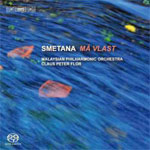 Smetana’s patriotic hymn to home is a glorious work, so
it’s always a pleasure to hear it in toto rather
than just the ubiquitous ‘Vltava’. I’ve had my
eye on this BIS release for a while, as the label is well known
for showcasing the talents of out-of-the-way orchestras; look
how they’ve single-handedly raised the profiles of the
São Paulo and Singapore bands, both of which have produced
a slew of fine recordings. The Malaysians made a terrific impact
with their BIS box of Rimsky-Korsakov under Kees Bakels (BIS-CD-1667/8),
so I had high hopes for this Má Vlast, conducted
by music director Claus Peter Flor. My review refers to the
24-bit download.
Smetana’s patriotic hymn to home is a glorious work, so
it’s always a pleasure to hear it in toto rather
than just the ubiquitous ‘Vltava’. I’ve had my
eye on this BIS release for a while, as the label is well known
for showcasing the talents of out-of-the-way orchestras; look
how they’ve single-handedly raised the profiles of the
São Paulo and Singapore bands, both of which have produced
a slew of fine recordings. The Malaysians made a terrific impact
with their BIS box of Rimsky-Korsakov under Kees Bakels (BIS-CD-1667/8),
so I had high hopes for this Má Vlast, conducted
by music director Claus Peter Flor. My review refers to the
24-bit download.
This work has been lucky on record, with fine, idiomatic versions
from Rafael Kubelik at the Prague Spring Festival (Supraphon
11 1208-2), Antoni Wit’s account on Naxos 8.550931 and,
a firm favourite of mine, Libor Pešek and the RLPO on Virgin
Classics 61223*. All are engaging, but few start as beautifully
as this newcomer, the harp figures in ‘Vyšehrad’
simply ravishing. The orchestra are as easeful and illuminating
as their European counterparts, every facet of ‘Vltava’
essayed in minute, ear-pricking detail as it grows from gurgling
stream to raging torrent. The recording needs to be cranked
up a bit before it snaps into focus, those pounding perorations
setting new standards for this old warhorse.
And believe me, this performance just gets better and better;
granted, rhythms in the epic ‘Šárka’ could
be a bit more pliant, but Flor and his band are undeniably thrilling
in the huge tuttis. Dynamics are extremely wide without being
splashy or self-consciously hi-fi; the sound is also remarkably
transparent, with some delectable woodwind and string playing
both here and in those idyllic woods and fields. Indeed, this
is a uniquely revealing account of Má Vlast, Flor’s
many felicities and insights making the piece seem utterly fresh.
And what an breathtaking close to ‘Šárka’,
the orchestra as incisive as one could wish for.
Tábor, with its quotation from the Hussite hymn
‘Ye Who are Warriors of God’, is especially atmospheric,
the tuttis expanding without hint of stress or strain; as for
the formidable battery of brass, cymbals and timps deployed
here, they’re presented with a rare, frisson-inducing immediacy
that’s simply awesome. Has this music ever sounded so implacable,
so forbidding? And then there’s the truly monumental, hewn-granite
quality to this rendition of Blaník that puts its illustrious
rivals to shame, the more lyrical episodes as beguiling as I’ve
ever heard. Any concerns that this Má Vlast might
lack weight or momentum have long since evaporated, Flor goading
his players to a scorching - but not overheated - finale.
Goodness, what a fabulous performance, and how well recorded.
BIS have been pilloried on some of the more toxic internet forums
for recording their SACDs at 44.1kHz, but this new release should
help to silence those harpies and nay-sayers. I must confess
I’ve had cause to grumble about some recent BIS recordings,
but after this cracking Má Vlast all is forgiven.
Indeed, this version goes right to the top of an already teetering
pile. Buy it!
Dan Morgan
[BIS on eclassical.com Download of the Month twice
running - and it’s no fix. Like Dan, I’ve lived with
and enjoyed several recordings over the years, including Kubelík’s
several versions, Sargent (an unlikely contestant, but his excellent
budget-price reissue on EMI was my first CD version - now on
Classics for Pleasure 9689522, for around £5 or download
from amazon.co.uk for £2.99) and Libor Pešek*. I
thought at first, and again at the opening of Vltava,
that this new recording was slow to get off the mark, but I
soon came to share Dan’s enthusiasm. Most conductors plunge
straight into Vltava, forgetting the direction non
agitato. As Dan has commented on the 24-bit flac, I tried
the CD-quality 16-bit and found it to be excellent.
* The RLPO/Pešek recording is now on Virgin 5221292, around
£7, or on a 2-CD set, with Dvořák, for a few
pence more, on 5617392. His recording with the Czech Phil is
even less expensive on Alto ALC1099. BW]
Bargain
of the Month
Leos JANÁČEK (1854-1928)
Orchestral Suites from the Operas
The Cunning Little Vixen Suite [16:44]
Osud (Fate) Suite [17:46]
From the House of the Dead Suite [19:57]
Czech Philharmonic Orchestra/František Jílek - rec.
1980s. DDD?
SUPRAPHON C37-7303 [54:28] - from emusic.com
(mp3)
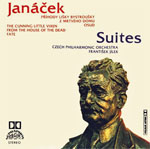 At
£1.26 or less, with idiomatic performances and good recording
- two tracks at 256kb/s and the third at the maximum 320kb/s
- this has to be excellent value, especially as the parent CD
seems to be available now only in a 3-CD set. My only grumble
concerns the illiterate attribution of the recording to the
‘Czech Philharmony’, who are, of course, actually
the Czech Philharmonic. Even if you have the complete operas,
the suites are well worth having.
At
£1.26 or less, with idiomatic performances and good recording
- two tracks at 256kb/s and the third at the maximum 320kb/s
- this has to be excellent value, especially as the parent CD
seems to be available now only in a 3-CD set. My only grumble
concerns the illiterate attribution of the recording to the
‘Czech Philharmony’, who are, of course, actually
the Czech Philharmonic. Even if you have the complete operas,
the suites are well worth having.
I was originally tempted to include another apparently even
better bargain from eMusic in the form of a Past Classics reissue
of the 1951 Karajan Bayreuth recording of Wagner’s Die
Meistersinger von Nürnberg, for £2.10 or
less, but the sound here is just too crumbly for recommendation.
The Naxos Historical refurbishment, available from classicsonline.com
or to stream from the Naxos Music Library, is not ideal - as
their notes indicate, it’s a problematic recording to restore
- but it’s much more listenable.
Freebie
of the Month
 The
Chicago Chamber Musicians are now offering their archive of
recordings free to stream online: www.encoreccm.org.
Often there are different recordings of the same work, as with
the Samuel BARBER String Quartet,
Op.11, performed by Joseph Genualdi, Jasmine Lin (violins),
Rami Solomonow (viola) and Stephen Balderston (cello) on October
4 and 5, 2009 - here
- complete with detailed programme notes. I thought the slow
movement (the original of the famous Adagio) a little
too sleepy, but enjoyed the performance otherwise - and who’s
complaining when it’s free? It’s certainly good enough
to tempt you to buy the Endellion Quartet version on an inexpensive
EMI CD of Barber’s music (6952322, around £7, or
download from amazon.co.uk
in mp3 for £5.49).
The
Chicago Chamber Musicians are now offering their archive of
recordings free to stream online: www.encoreccm.org.
Often there are different recordings of the same work, as with
the Samuel BARBER String Quartet,
Op.11, performed by Joseph Genualdi, Jasmine Lin (violins),
Rami Solomonow (viola) and Stephen Balderston (cello) on October
4 and 5, 2009 - here
- complete with detailed programme notes. I thought the slow
movement (the original of the famous Adagio) a little
too sleepy, but enjoyed the performance otherwise - and who’s
complaining when it’s free? It’s certainly good enough
to tempt you to buy the Endellion Quartet version on an inexpensive
EMI CD of Barber’s music (6952322, around £7, or
download from amazon.co.uk
in mp3 for £5.49).
There are also two performances of Georg
Philipp TELEMANN’s Concerto in D for trumpet,
two oboes and continuo, TWV43:D7 (November 08 and 09, 2009 -
here) - a
little lacking in power, but I can’t find any current alternative
on CD or download.
Best of all the performances that I tried was Aaron
COPLAND Appalachian Spring, the Suite in the chamber
version, recorded on May 31, 2000 - here.
My favourite recording/download remains Michael Tilson Thomas’s
of the complete ballet, with Billy the Kid and Rodeo
on RCA, available from amazon.co.uk on mp3 for just £4.14
(see October 2009 Download
Roundup). The download comes at the full 320kb/s rate, not
256kb/s as I originally thought.
***
Joseph HAYDN
(1732-1809) The London Symphonies
Symphonies Nos. 93 to 104*
includes bonus disc containing Symphonies Nos. 88**, 91†
and 98**
London Philharmonic Orchestra*; Berlin Philharmonic Orchestra**;
Bavarian Radio Symphony Orchestra†/Eugen Jochum - rec.
1958†, 1961/2**, 1971/2*
DG COLLECTOR’S EDITION 474 364-2 [5 CDs: 6:20:14]
- from passionato.com
(mp3 and lossless)
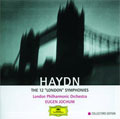 For
most listeners this would be close to the ideal recording of
these symphonies: though recorded with modern orchestras when
informed period playing was barely in its infancy, Jochum’s
Haydn is never overblown and still sounds fresh. Add the fact
that the set is available as a download only, as far as I’m
aware, and at an attractive price, in lossless flac as well
as good mp3, and it becomes nigh irresistible. DG even have
a further trick up their corporate sleeve in adding Symphony
No.88 and a second version of No.98 from an earlier recording
with the Berlin Phil, plus No.91 with the Bavarian RSO.
For
most listeners this would be close to the ideal recording of
these symphonies: though recorded with modern orchestras when
informed period playing was barely in its infancy, Jochum’s
Haydn is never overblown and still sounds fresh. Add the fact
that the set is available as a download only, as far as I’m
aware, and at an attractive price, in lossless flac as well
as good mp3, and it becomes nigh irresistible. DG even have
a further trick up their corporate sleeve in adding Symphony
No.88 and a second version of No.98 from an earlier recording
with the Berlin Phil, plus No.91 with the Bavarian RSO.
In both recordings of No.98 Jochum is one of the few conductors
to include Haydn’s little joke with the harpsichord in
the finale - just when you think the work has finished, the
harpsichord, already old-fashioned by this time as a continuo
instrument, is allowed to tinkle away for the last 40 seconds
or so. It’s not exactly enough to bring the house down,
but it does remind us that the po-faced papa Haydn image is
far from the truth.
Only Beecham works greater magic in these symphonies and he
used an outdated edition. (EMI 3678932, 4 CDs, or as part of
Sir Thomas Beecham: The Classical Tradition, 9099462,
10 CDs of Haydn and Mozart - see review).
Incidentally, you are likely to find that 10-CD set online for
about the same price as any download that I’ve been able
to discover, or even less.
If you’re not in the market for a complete set of the ‘London’
Symphonies, plus Nos.88 and 91, ClassicFM Full Works have an
inexpensive coupling of Nos.94, 100 and 104 from Colin Davis’s
complete Philips set* - download from amazon.co.uk.
You’ll also find reviews of individual works in the list
below:
- Symphonies Nos. 44, 88 and 104: Naxos - Wordsworth (July 2009)
- Symphonies Nos. 83, 94 and 101: Naxos - Wordsworth (June 2009)
- Symphonies Nos. 85, 92 and 103: Naxos - Wordsworth (June 2009)
- Symphonies Nos. 91 and 92; Scena di Berenice: Harmonia
Mundi Gold - Jacobs (August 2009) [also available now from classicsonline.com]
- Symphonies Nos. 93-95: Hyperion Helios - Goodman (January
2011)
- Symphony No.94: Beulah - Giulini (June 2010)
* on two Philips Duo sets: 442 6112 and 442 6142, around £8.50
each. Downloads are unlikely to be much - if any - less expensive.
Charles Hubert H. PARRY (1848-1918)
Complete Symphonies
Symphony No. 1 in G (1882) [42:39]
Symphonic Variations (1897) [14:04]
Symphony No. 2 in F ‘The Cambridge’ (1883, rev.1887)
[37:46]
Symphony No.3 in C ‘The English’ (1888/89) [34:40]
Symphony No. 4 in e minor (1888/89) [41:40]
Symphony No. 5 in b minor ‘Symphonic Fantasia’ (1912)
[26:53]
London Philharmonic Orchestra/Matthias Bamert - rec. May 1990,
January 1991, January 1991 and January 1992. DDD.
pdf booklet included.
CHANDOS CHAN9120 [3 CDs: 196:56] - from theclassicalshop.net
(mp3 and lossless)
Though there are other recommendable versions of some of the
symphonies, such as the recent Nimbus First Symphony and From
Death to Life (NI5296 - see review),
this is the only complete set of the symphonies of a major symphonic
composer whose work is only now being appreciated again, and
it’s very satisfying. My own favourite, the Second Symphony,
receives a performance which I prefer to the otherwise recommendable
Naxos recording from Andrew Penny (8.553469, with Symphonic
Variations and Overture to an Unwritten Tragedy).
The only problem with the set is that it involves duplication
of Bamert’s performance of the Symphonic Variations
which I recommended on a single budget-price Chandos Collect
disc last month. If that’s a major problem, or you don’t
wish to go for the complete set, Chandos still offer the individual
discs as a download, though not on CD any longer:
- Symphony No.1 and Concertstück, CHAN9062
- Symphony No.2 and Symphonic Variations CHAN8961
- Symphonies Nos.3 and 4 CHAN8896
- Symphony No.5, From Death to Life and Elegy for Brahms CHAN8955
Sir Edward ELGAR (1857-1934)
String Quartet in e minor, Op. 83 [26:57]
Piano Quintet in a minor, Op. 84* [37:38]
Ian Brown (piano)*; Sorrel Quartet (Gina McCormack, Catherine
Yates (violins), Sarah-Jane Bradley (viola), Helen Thatcher
(cello)) - rec. November 2000. DDD.
CHANDOS CHAN9894 [64:37] - from theclasssicalshop.net
(mp3 and lossless)
String Quartet in e minor Op 83** [27:41]
Mina* [3:06]
Laura Valse* [2:39]
March in D * [4:44]
Impromptu* [0:27]
Piano Quintet in a minor Op 84*/** [38:51]
Piers Lane (piano)*; Goldner String Quartet** (Dene Olding,
Dimity Hall (violins), Irina Morozova (viola), Julian Smiles
(cello)) - rec. July 2010. DDD.
HYPERION CDA67857 [77:28] - from hyperion-records.co.uk
(mp3 and lossless)
Violin Sonata in e minor Op 82* [25:13]
Piano Quintet in a minor Op 84 [38:09]
The Nash Ensemble (Marcia Crayford (violin*); Elizabeth Layton
(violin); Roger Chase (viola); Christopher Van Kampen (cello);
Ian Brown (piano*)
HYPERION HELIOS CDH55301 [63:23] - from hyperion-records.co.uk
(mp3 and lossless)
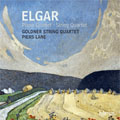 Never
judge a book by its cover or a recording by an initial hearing.
The first time round I thought the Piers Lane/Goldner
performance of the String Quartet somewhat lacking in intensity
but after two more hearings, though I still think there could
have been just a shade more passion, especially in the slow
movement, I now find the performance overall very satisfying.
What it lacks in intensity it makes up for in beauty, warmth
and tenderness.
Never
judge a book by its cover or a recording by an initial hearing.
The first time round I thought the Piers Lane/Goldner
performance of the String Quartet somewhat lacking in intensity
but after two more hearings, though I still think there could
have been just a shade more passion, especially in the slow
movement, I now find the performance overall very satisfying.
What it lacks in intensity it makes up for in beauty, warmth
and tenderness.
The coupling with the Piano Quintet - with or without some short
filler(s) - is not as traditional as might have been expected
on CD. There is strong competition, however, from Ian Brown
and the Sorrel Quartet on Chandos: Christopher Fifield thought
this contained exciting playing of the highest order - see review
- though Simon Foster was not wholly impressed - see review.
There’s also a highly-regarded budget-price version on
Naxos (8.553737, Peter Donohoe and the Maggini Quartet - from
classicsonline.com).
It’s also worth looking out for the 1994 recording by Piers
Lane and the Vellinger Quartet if you can find a decent second-hand
copy or remainder. (EMI Eminence 5654542).
In the Quintet, Lane and the Goldners still favour warmth over
intensity, though there’s plenty of the latter in the climax
at the centre of the first movement and, once again, this was
a reading which grew on me.
The short piano pieces are attractive but would hardly clinch
the issue in favour of the new recording, especially as Hyperion
are competing with themselves in the Quintet; they already have
a fine performance from the Nash Ensemble, coupled with
the Violin Sonata, at budget price. If you can live with the
Sonata rather than the Quartet - why not? - the Helios recording
is unbeatable, especially at the price.
The Art of Eric SATIE (1866-1925)
3 Gymnopédies [3:08 + 2:28 + 2:28]
Pièces froides, ‘Airs à faire fuir’
[3:08 + 1:08 + 3:10]
Embryons desséchés [1:40 + 2:37 + 1:23]
Véritables Préludes flasques [Pour un Chien]
[0:36 + 0:52 + 0:38]
3 Valses distinguées du précieux dégoûté
[0:50 + 0:49 + 0:44]
Sports et Divertissements [11:14]
Avant-dernières Pensées [3:13]
Vieux Sequins et vielles Cuirasses [3:19]
Prélude de la Porte Héroïque du Ciel
[4:13]
Gnossiennes 1, 3-5 [9:16]
Heures séculaires et instantanées 1-3 [3:05]
Je te veux [4:17]
Ragtime-Parade [2:11]
Joanna MacGregor (piano) - rec. August 1989. DDD.
WARNER CLASSICS & JAZZ SOUND CIRCUS 2564672635 [66:49]
- from amazon.co.uk
(mp3)
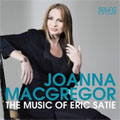 This
recording first appeared on the now defunct Collins label in
1991. I’m pleased to see that the best Collins recordings
are being saved by other labels; none are more valuable than
Joanna MacGregor’s contributions, and this is a prime example.
Idiomatic playing combined with good recording make this a real
bargain at its new price - around £8 on CD or less than
£5 to download. Satie-lovers will not find everything
necessary here, but it would make good start for those who don’t
yet know his music.
This
recording first appeared on the now defunct Collins label in
1991. I’m pleased to see that the best Collins recordings
are being saved by other labels; none are more valuable than
Joanna MacGregor’s contributions, and this is a prime example.
Idiomatic playing combined with good recording make this a real
bargain at its new price - around £8 on CD or less than
£5 to download. Satie-lovers will not find everything
necessary here, but it would make good start for those who don’t
yet know his music.
This reissue reached me via Warner’s Play MPE Player, mainly
designed to facilitate distribution to reviewers, but also available
for purchase by the public, along with MacGregor’s Bach
and Scarlatti recordings, which are also available inexpensively
on CD or as downloads from amazon.co.uk.
Vitězslav NOVÁK (1870-1949)
Symphonic Poems
About the Eternal Longing, Op.33 [20:35]
In the Tatra Mountains, Op.26 [16:45]
Moravian-Slovak Suite, Op.32 [27:20]
Czech Philharmonic Orchestra; Brno State Philharmonic Orchestra/Karel
Šejna. ADD.
SUPRAPHON 11-0682-2 [64:58] - from emusic.com
(mp3)
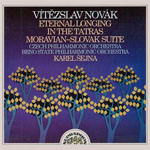 This
idiomatic recording of three attractive works seems to be no
longer available on disc, so the download is all the more welcome.
The only piece that I had encountered before, In the Tatra
Mountains, also sometimes known as In the Tatras,
is also available on CD and as a download in the Supraphon Ancerl
Gold series (SU36882), but the coupling there is music by Slavicky.
About the Eternal Longing and the Moravian-Slovak
Suite are well worth hearing, which makes this download
a must, especially at £2.94 or less. Non-members of eMusic
will find it at amazon.co.uk for £4.99. The sound is more
than acceptable: most tracks are at 256kb/s or a little below,
with one at the full 320kb/s.
This
idiomatic recording of three attractive works seems to be no
longer available on disc, so the download is all the more welcome.
The only piece that I had encountered before, In the Tatra
Mountains, also sometimes known as In the Tatras,
is also available on CD and as a download in the Supraphon Ancerl
Gold series (SU36882), but the coupling there is music by Slavicky.
About the Eternal Longing and the Moravian-Slovak
Suite are well worth hearing, which makes this download
a must, especially at £2.94 or less. Non-members of eMusic
will find it at amazon.co.uk for £4.99. The sound is more
than acceptable: most tracks are at 256kb/s or a little below,
with one at the full 320kb/s.
Josef SUK (1874-1935)
Symphony No. 2 in C minor, ‘Asrael’, Op. 27 (1905-1906)
Malaysian Philharmonic Orchestra/Claus Peter Flor
rec. September 2008, the Dewan Filharmonic PETRONAS, Kuala Lumpur,
Malaysia
BIS-SACD-1776 [60:18] - from eclassical.com
(16- and 24-bit flac, mp3)
 The
current issue of a music magazine is featuring its reviewers’
musical bores. I’m appalled to find some of my favourite
works among their choices, but they may be equally astonished
at my nominations. Chief among them are Schoenberg’s Gurrelieder
- long ago nicknamed by some of my university friends and myself
the Dreary-lieder. I’m sorry to say that the Asrael
Symphony is also on the list: despite having heard several recommended
recordings, I find it to be a work of considerable longueurs
and occasional excitements.
The
current issue of a music magazine is featuring its reviewers’
musical bores. I’m appalled to find some of my favourite
works among their choices, but they may be equally astonished
at my nominations. Chief among them are Schoenberg’s Gurrelieder
- long ago nicknamed by some of my university friends and myself
the Dreary-lieder. I’m sorry to say that the Asrael
Symphony is also on the list: despite having heard several recommended
recordings, I find it to be a work of considerable longueurs
and occasional excitements.
I listened to this new recording, therefore, with hope and expectation,
knowing that Dan Morgan, similarly not totally convinced, was
listening to it. I found fewer longueurs here than before but,
despite some undeniably fine playing and recording, was still
not wholly convinced.
Knowing that Dan was listening to the 24-bit version, I tried
the less expensive 16-bit CD-quality flac, which sounds very
well except that I have to warn you not to try to listen in
the car: the dynamic range would mean that setting the volume
at a decent level for the louder passages would render the opening
and several other parts of the symphony inaudible.
Having said my bit, I’ll turn to Dan’s more detailed
thoughts:
We all have them - musical blind spots, that is - and I confess
that Asrael, Suk’s ‘mourning symphony’,
is one of mine. From the time I first heard it I’ve always
felt like a nineteenth-century explorer hacking through a particularly
dense patch of jungle - an awful lot of sweat for precious little
progress. I quietly consigned the work to my mental archive
for an airing at a later date, but then RB’s upcoming review
of Sir Charles Mackerras’s version (Supraphon SU 4043-2)
rekindled my interest in this most elusive piece. And as I’d
just reviewed the Flor/Malaysian Philharmonic Má Vlast
(see above) their recording seemed a good place to start.
Given that Suk’s symphony is an extended lament for the
loss of his wife Otylka and father-in-law Antonín Dvo?ák,
the subtitle ‘Asrael’ - the Islamic angel of death
who leads the departed into Paradise - is very apt. Cast in
five movements - the first three played without a break - this
symfonie pro velký orchestr is not as impenetrable
as I remember it. Certainly the quiet introduction to the Andante
sostenuto and the stoic music that follows suggests rather more
transparent textures and a sparing use of resources. The sound
is detailed and spacious, the insistent tuttis in this movement
very well caught.
Having already remarked on the quality of this orchestra in
my Smetana review, I’m happy to say the playing here has
a hushed intensity that is most impressive. Moreover, Flor maintains
a sense of scale that works wonders in a piece that can easily
seem otiose. Just listen to those deeply felt, most inward passages
at the seven-minute mark; the muted brass and timps have a wonderful
presence. A Damascene conversion? Not quite, but I did find
myself listening to this symphony with new ears and - most important
- I sensed a narrative that has eluded me thus far. And what
a pole-axing peroration at around 13:00, the bass drum suitably
grief-struck.
But it’s the interior quality of this reading that is most
surprising, the first movement sliding seamlessly into the second.
There’s a profound stillness here, a sense of communion
perhaps, that I’ve not heard before, the engineers picking
out every detail of this score, As for the not-very-vivacious
Vivace - Suk’s, not Flor’s - it’s played with
grace and point, the harp adding a much-needed touch of colour
to an otherwise dull canvas. The dark-hued Adagio has plenty
of body, if not much thrust; indeed, the transparency of Suk’s
scoring really does delight the ear, although that’s not
always enough for me.
And that’s where I struggle with ‘Asrael’; its
undoubted virtues are undermined by the threat of stasis. This
is especially true of the Adagio where, despite moments of mobility,
the music is inclined to flag. Perhaps it’s a much delayed
resolution - if indeed such closure is even possible here -
which stretches the narrative thread to breaking point. And
despite radiant playing the final Adagio maestoso still perplexes
me. It may be quietly affirmative, but it still strikes me as
strangely opaque.
Qualms aside, this is a very polished, insightful reading of
‘Asrael’. That this symphony still eludes me is a
source of regret, but at least Flor and his band have persuaded
me it’s a better piece than I remembered. The 24-bit recording
is pretty good too - if not as spectacular as the Smetana -
the liner-notes clear and informative. Flor remains a solid
choice for this work, at least until the much-heralded Mackerras
version arrives as a download*.
Dan Morgan
[* emusic.com have several Supraphon recordings of the work,
from Bělohlávek, Talich and Pesek but not, as yet,
the Mackerras. BW]
Sergei PROKOFIEV (1891-1953)
Romeo and Juliet (complete ballet)
Mariinksy (Kirov) Orchestra, St Petersburg/Valery Gergiev -
rec. 1990. DDD.
PHILIPS 464 7262 [144:04] - from passionato.com
(mp3 and lossless)
Of several fine recordings of the complete Romeo and Juliet,
this wins by a nose, at least in part because of the Russian
orchestra. Though you may recall the fiery moments more, there
is some very delicate music in the score and Gergiev brings
these out as well as the rest - plenty of menace in the Dance
of the Knights, for example, followed by delicacy in the next
track, Juliet’s Variation. The lossless transfer is good,
apart from a very abrupt cut-off at the end of track 33 which
intrudes on the Death of Mercutio, and the recording is offered
at a keen price: £7.99 for mp3, £9.99 for lossless
flac. Passionato also have excellent versions from Previn, Maazel
and Ashkenazy; don’t download the Previn version on EMI,
though, from passionato - they charge more than twice the price
at which it’s available on CD, which makes a strange contrast
with their generous price for the Gergiev.
Classicsonline.com have the more recent award-winning LSO Live
performance, with Gergiev at the helm again - here
- but at £15.98 it’s not very competitive with the
SACDs, which can be had online for as little as £9.99,
including p&p. See review
by Mark Berry of the live performance at the Barbican.
Sir William WALTON (1902-1983)
Symphony No.1 in b-flat minor (1932-35)* [44:15]
Siesta (1926) [5:21]
Symphony No.2 (1956-60) [28:27]
BBC Scottish Symphony Orchestra/Martyn Brabbins - rec. November-December
2010. DDD
HYPERION CDA67794 [78:05] - from hyperion-records.co.uk
(mp3 and lossless)
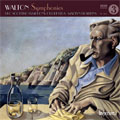 This
could well have been Download of the Month. We’ve not had
such a generous coupling of both of Walton’s symphonies
since Mackerras’s 1989 recording with the LPO and LSO on
EMI Eminence (CD-EMX2151 or CDM 7632612) - not one of Sir Charles’s
very best recordings but good value as part of an EMI 2-CD set
for around £8.50 (0947082)*. There’s very little
that I need to add to the strong recommendations given by John
Quinn and Rob Barnett which appeared together almost before
the parent CD or the download was available - here.
The download comes complete with the booklet and, at £7.99
for mp3 or lossless flac, undercuts the price of the CD. If
you choose the flac, there should be no loss of quality as against
the disc.
This
could well have been Download of the Month. We’ve not had
such a generous coupling of both of Walton’s symphonies
since Mackerras’s 1989 recording with the LPO and LSO on
EMI Eminence (CD-EMX2151 or CDM 7632612) - not one of Sir Charles’s
very best recordings but good value as part of an EMI 2-CD set
for around £8.50 (0947082)*. There’s very little
that I need to add to the strong recommendations given by John
Quinn and Rob Barnett which appeared together almost before
the parent CD or the download was available - here.
The download comes complete with the booklet and, at £7.99
for mp3 or lossless flac, undercuts the price of the CD. If
you choose the flac, there should be no loss of quality as against
the disc.
Whatever you do, don’t throw out Previn’s recording
of No.1 (RCA/Sony) and/or Szell’s of No.2 (Sony).
* download for £5.99 from amazon.co.uk here.
Benjamin BRITTEN (1913-1976)
Young Apollo, Op.6, for piano, string quartet and strings [7:06]
Double Concerto in b minor for violin, viola and orchestra [21:31]
Two Portraits: No.1 - David Layton, for string orchestra [9:10]
No.2 - E.B.B., for solo viola and string orchestra [5:43]
Sinfonietta, Op.1, for chamber orchestra [14:37]
Gidon Kremer (violin); Yuri Bashmet (viola); Nikolai Lugansky
(piano)
String quartet: Lyn Fletcher, Dara de Cogan (violins); Tim Pooley
(viola); Peter Worrall (cello)
Hallé Orchestra/Kent Nagano - rec. February and November
1998. DDD.
WARNER CLASSICS & JAZZ APEX 2564673917 [58:36] -
on CD
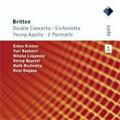 This
recording was already excellent value on the mid-price Elatus
label; on the even less expensive Apex label, it’s a give-away:
there’s not much competition, especially in the Double
Concerto. Even in Young Apollo, where we have the
Hyperion recording which you may marginally prefer, if only
because it’s more logically coupled with the Piano Concerto
(see Hyperion
Top 30 and review
by John France: Recording of the Month), Lugansky
and Nagano offer strong competition.
This
recording was already excellent value on the mid-price Elatus
label; on the even less expensive Apex label, it’s a give-away:
there’s not much competition, especially in the Double
Concerto. Even in Young Apollo, where we have the
Hyperion recording which you may marginally prefer, if only
because it’s more logically coupled with the Piano Concerto
(see Hyperion
Top 30 and review
by John France: Recording of the Month), Lugansky
and Nagano offer strong competition.
As yet, the album doesn’t seem to be available for download
in the UK, except to stream via the Play MPE Player, which is
mainly intended for reviewers, but the CD is extremely inexpensive.
Don’t buy the more expensive earlier reissue on Warner
Elatus or Warner Masters which some suppliers still offer.
Beyond All Mortal Dreams: American a Cappella
René CLAUSEN (b.1953) Tonight
eternity alone [3:38]
Steven STUCKY (b.1949) Three
Motets in Memoriam Thomas Tallis: O admirabile commercium
[4:07]; O sacrum convivium [2:52]; O vos omnes
[4:42]
Ola GJEILO (b.1978) Sanctus
[4:54]
Frank FERKO (b.1950) Hildegard
Triptych: O vis æternitatis [4:59]; Caritas
abundat [3:00]; O virtus sapientiæ [2:18]
Edwin FISSINGER (1920-1990)
Lux æterna [7:50]
Healey WILLAN (1880-1968) Fair
in face [2:08]; I beheld her, beautiful as a dove [2:09]; Rise
up, my love, my fair one [1:48]; How they so softly rest [3:44]
Stephen PAULUS (b.1949) The
day is done [5:20]; Pilgrims: Hymn [3:03]; Hymn to the Eternal
Flame [2:08]
William HAWLEY (b.1959)
Mosella [2:16]; Te vigilans oculis [2:24]
Ola GJEILO Phoenix [5:04]
The Choir of Trinity College, Cambridge/Stephen Layton - rec.
July 2010. DDD.
Pdf booklet with texts and translations included
HYPERION CDA67832 [68:35] - from hyperion-records-co.uk
(mp3 and lossless)
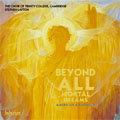 I’ve
recommended several recordings for winding down after a stressful
day; now here’s another strong recommendation. If ‘American
a Cappella’ makes you think barber-shop, you couldn’t
be more wrong: this is music which clearly stands at the modern
end of the mainstream of Western choral music. It’s significant
that several of the texts are in the eternal language, Latin,
and that six of the works pay conscious homage to two great
early landmarks in that mainstream, Abbess Hildegard of Bingen
and Thomas Tallis. Although all the music could be described
as soothing, there’s plenty of variety here, too.
I’ve
recommended several recordings for winding down after a stressful
day; now here’s another strong recommendation. If ‘American
a Cappella’ makes you think barber-shop, you couldn’t
be more wrong: this is music which clearly stands at the modern
end of the mainstream of Western choral music. It’s significant
that several of the texts are in the eternal language, Latin,
and that six of the works pay conscious homage to two great
early landmarks in that mainstream, Abbess Hildegard of Bingen
and Thomas Tallis. Although all the music could be described
as soothing, there’s plenty of variety here, too.
I have no benchmarks for the performances, but it’s hard
to imagine the music being better sung. The presentation and
recording are all that we expect from Hyperion. This was a strong
contender for Download of the Month.
Fine Music 2
Johann Sebastian BACH
Cello Suite No.1 in G: Prelude [2:27]
Michael EVANS Concerto for
Piano and Orchestra: Movement III, Allegro con moto [5:45]
Stephen BARKER Les Mots
[2:45]
Jose ELIZONDA Danzas
latinomericanos: Pan de Azúcar [5:01]
Judith Lang ZAIMONT Serenade
(version for piano trio) [5:15]
Ron NAGOREKA Out of the
Blue [2:59]
Hendryk HOFMEYR Ainsi
qu’on oît le cerf bruire [16:37]
Osias WILENSKI La Venganza
de Carmen (Carmen’s Revenge): Act I, scene i [5:42]
Ingrid STÖLZEL The
Road is all [12:04]
Hans BAKKER Cantus
for String Orchestra [5:41]
Nicholas SACKMAN Concertino
for Violin and Orchestra [10:46]
Beth Pearson (cello); Lawrence Figg (cello); Marina Comas (cello);
Ovidiu Marinescu (cello) Paul Wiancko (cello); Salvador Frances
(clarinet); Tosca String Quartet; Jennifer Yeaton-Paris (flute);
Jose Guna (flute); Moravian Philharmonic Orchestra/Vit Micka;
Ferran Armengol (percussion); Awadagin Pratt (piano); Karolina
Rojahn (piano); Osias Wilenski (piano); Paul Dykstra (piano);
Robert Pherigo (piano); Maria Rosa Lopez (soprano) Melissa Manseau
(soprano); Anne-Marie Brown (violin); Melissa White (violin);
Ondrej Lebr (violin); Yana Tsanowa (violin)
NAVONA RECORDS NV5851 [75:02] - from classicsonline.com
(mp3) or stream from Naxos Music Library
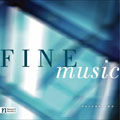 Last
month I recommended Volume 1 of this series of inexpensive Navona
samplers and the second album is equally attractive. Be warned
that you’ll want to follow up more music by most of the
composers here - and with classicsonline.com charging just £4.99
for each of the parent albums you’ll hardly be able to
resist.
Last
month I recommended Volume 1 of this series of inexpensive Navona
samplers and the second album is equally attractive. Be warned
that you’ll want to follow up more music by most of the
composers here - and with classicsonline.com charging just £4.99
for each of the parent albums you’ll hardly be able to
resist.
Volume 2 opens with a decent rendition of the Prelude to Bach’s
first Cello Suite - rather too short to make much impact, except
as a warning that this recording is transferred at a high level:
I recommend a volume cut of about 6dB. The jazzy movement from
Michael Evans Piano Concerto which follows is very likable indeed
and makes me want to hear the whole work. He has a whole album
to himself on NV5813, but the Concerto recording doesn’t
appear to be available yet. Stephen Barker’s Les Mots
is equally attractive in its wistful way: once again, the extract
is moreish, as is the movement from Jose Elizondo’s Danzas,
taken from an album of Latin American Music (NV5820:
there’s also an extract from this on Fine Music 1).
If the rest of the music on the Hans Bakker album is as good
as Cantus, that, too, is well worth having. (NV5832)
In fact, apart from the well-enough-known Bach, all the music
here was new to me, all of it attractive in different ways and
none of it unduly avant-garde. Even the quirky and rather angular
Sackman Concertino which concludes the album is no more difficult
than Bartók or Hartmann.
The longest piece, Ainsi qu’on oît le cerf bruire
is a setting of Psalm 42, ‘As the hart panteth after the
water brooks’, most famously set by Sweelinck. Though Hofmeyr’s
setting could hardly be mistaken for anything other than modern,
I’m guessing that the mainly fairly conservative style
and the employment of the archaic French text [oît
= hears] was intended as a conscious link between past and present.
Be that as it may, it’s an impressive piece and I was hoping
to hear more but that’s the only Hofmeyr piece on the parent
Navona recording from which it’s taken. (NV5827).
That guess about the Hofmeyr has to be just that: the download
comes without any information other than the back cover - and
that’s rather hard to read because it’s printed in
blue on blue. The extract from Wilenski’s Carmen’s
Revenge makes little sense out of context but some notes
might have helped.
Please
buy me...
Leos JANÁČEK (1854-1928)
The Eternal Gospel, Legend for soprano, tenor, chorus
and orchestra* [18:45]
The Ballad of Blaník [8:02]
The Fiddler’s Child, Ballad for solo violin and
orchestra** [11:46]
The Excursions of Mr Brouček, Suite for orchestra,
compiled by Jaroslav SMOLKA and Jiří ZAHRÁDKA
[20:58]
Angel: Gweneth-Ann Jeffers (soprano)*
Joachim of Fiore: Adrian Thompson (tenor)*
Edinburgh Festival Chorus*
Elizabeth Layton (violin)**
BBC Scottish Symphony Orchestra/Ilan Volkov - rec. 2004/5. DDD.
HYPERION CDA67517 [59:54] - from hyperion-records.co.uk
(mp3 and lossless)
[Recording of the Month, October 2005 - see review
by Evan Dickerson.]
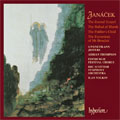 From
time to time I feature Hyperion recordings which have been so
undeservedly neglected that they have found their way onto the
half-price ‘Please someone buy me’ list, in the hope
that they won’t feature there again. As usual, this recording
won’t be on offer at half price by the time that you read
this review, but it’s still excellent value as an mp3 or
lossless download. Whichever format you choose, you won’t
be disappointed.
From
time to time I feature Hyperion recordings which have been so
undeservedly neglected that they have found their way onto the
half-price ‘Please someone buy me’ list, in the hope
that they won’t feature there again. As usual, this recording
won’t be on offer at half price by the time that you read
this review, but it’s still excellent value as an mp3 or
lossless download. Whichever format you choose, you won’t
be disappointed.












